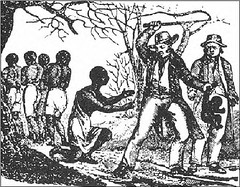
Artistic depiction of the racist slave system. The profits accrued from the exploitation of Africans fueled the development of the world captialist system.
Originally uploaded by Pan-African News Wire File Photos
By Dolores Cox
Published Oct 23, 2008 10:09 PM
Oh, how the mighty have fallen.
Several financial institutions involved in the current U.S. economic crisis—Lehman Bros., Wachovia Bank, Chase Bank and Aetna Inc.—have interesting background stories and one thing in common: their connection to the inhumane institution of slavery.
Numerous capitalist merchants benefited hugely from the transatlantic slave trade and the industries associated with it. For several centuries the economies of the U.S. North and South were intertwined by slavery. By the mid-1800s, capital investment in slaves was higher than the value of land or any other capital worth.
Southern slave labor made New York City the financial capital of the world. Cotton produced on plantations became the main product of export and a major source of the city’s wealth. Large textile mills gave New York State a booming economy.
Both cotton and enslaved workers treated as “property” were among the first commodities on the stock market. Cotton trading accounted for the country’s expansive growth for an extended historical period. Profits from the slave trade financed the industrial revolution.
The Lehman family members were Alabama cotton brokers. In 1850 they founded Lehman Brothers Investments, acquiring their capital and wealth by investing and trading in cotton. Three sons moved to New York City in 1858, where they later helped to establish the New York Cotton Exchange (1870).
In 1781, Wachovia Bank of North Carolina was founded on the profits of the slave trade. Its predecessors, the Bank of Charleston, S.C., and the Bank of North America, made loans to slave “owners” and accepted slaves as collateral. When the owners defaulted on the loans the banks became the new slave owners.
The Morgan family of Massachusetts was a major stock broker. JP Morgan brokers became JP Morgan/Chase. Their predecessor banks also made loans to slave owners and accepted 13,000 enslaved Africans as “collateral.” When owners defaulted, the banks acquired their fortunes by becoming the new owners of 1,250 slaves. Chase Bank is owned by the Rockefeller family.
Another profitable company was Aetna Insurance Co., which sold insurance to slave owners wanting to protect their investments of human cargo aboard the slave ships and on the plantations, should a slave die. The life insurance policies, issued in the 1850s, were intended to compensate slave owners for the loss of people who were at that time considered “property.”
Wall Street and slavery are connected in other ways. Wall Street got its name because of a physical wall built there along the river to protect New York City from invasion. Slave labor built the wall and much of the city. Slave auctions were held at the foot of Wall Street when ships carrying enslaved Africans arrived.
Slavery resulted in these capitalistic enterprises becoming profitable and powerful. The foundation of U.S. capitalism was built on slave labor and racism. After the Civil War, the U.S. went from competitive capitalism to imperialism and became a financial empire.
Now the government is bailing out these same companies and the burden again is falling most heavily on the working class, including the descendents of those slaves.
If only the enslaved Africans could have been fortunate enough to have been bailed out of the slavery system, but it’s not too late for their descendents to be given reparations.
Sources for the article include the Black Holocaust Museum of Slavery in Philadelphia; “The Debt: What America Owes to Blacks” by Randall Robinson; and “Complicity: How the North Promoted, Prolonged, and Profited from Slavery” by Anne Farrow, Joel Lang and Jenifer Frank.
--------------------------------------------------------------------------------------------
Articles copyright 1995-2008 Workers World. Verbatim copying and distribution of this entire article is permitted in any medium without royalty provided this notice is preserved.
Workers World, 55 W. 17 St., NY, NY 10011
Email: ww@workers.org
Page printed from:
http://www.workers.org/2008/us/lehman_1030/
No comments:
Post a Comment